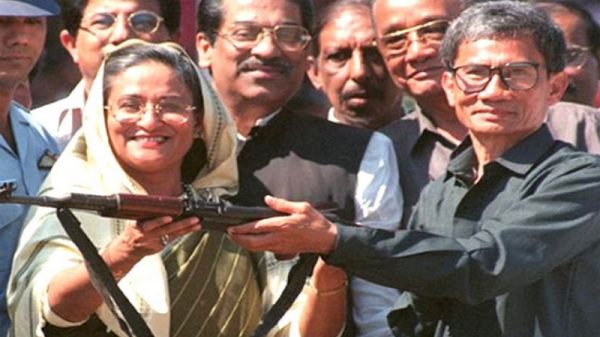24 Years of CHT Peace Accord: Conflict among regional groups hinders peace

Shawdesh Desk:
Implementation of the much-talked-about ‘Chattogram Hill Tracts Peace Accord’ signed 24 years ago to establish peace in the country’s hilly region has remained as elusive, thanks to conflicts and bloodletting armed clashes among the regional groups.
Experts said the armed groups’ efforts to establish supremacy for grabbing annual extortion business of around Tk 400 crore is the main cause of conflicts and clashes in the hilly region.
The terrorist groups carry out indiscriminate extortion, abduction and killings in the region for increasing the area of influence.
Their clashes frequently claim lives of the tribal and Bangalee people living there, sources said.
According to available statistics, a total of 467 persons — 327 tribal people and 140 Bangalees — were killed while 1,216 persons injured and 711 persons abducted in only a span of eight years since 2013 in the three hill districts of Rangamati, Khagrachhari and Bandarban.
Besides, a total of 292 incidents of exchanging fires were taken place during the period while law enforces arrested 1,977 tribal terrorists, recovered 812 firearms and 12,851 rounds of ammunition during the period. Mentionable, the historic ‘Chattogram Hill Tracts Peace Accord’ was signed between the government and Parbatya Chattogram Jana Sanghati Samiti (PCJSS) on December 2 in 1997 during the first tenure of Prime Minister Sheikh Hasina.
The then Jatiya Sangsad Chief Whip and National Committee on Chittagong Hill Tracts Affairs Convener Abul Hasnat Abdullah signed the agreement on behalf of the government while Jyotirindra Bodhipriyo Larma (Santu Larma) on behalf of the PCJSS.
But, a group of the tribal people led by Prosit Bikash Khisa formed the United People’s Democratic Front (UPDF) opposing the peace accord in 1998.
The PCJSS also witnessed a split as some of its leaders left the organisation in 2007 and formed PCJSS (Reformists) under the leadership of Tatindra Lal Chakma and Sudha Sindho Khisa.
After one decade, the UPDF saw separation and UPDF (Democratic) led by Tapan Jyoti Chakma was formed on November 15 in 2017.
Though people of the hill tracts thought that their lives would change and the bloodshed would come to an end following the treaty, the four groups started bloody clashes for establishing supremacy and increasing area of influence claiming lives.
As one of the main conditions of submitting all firearms is yet to be fulfilled, complete implementation of the treaty and development activities in the hilly areas are being hampered, sources concerned said.
They said 48 clauses out of the total 72 of the peace accord have already been implemented while 15 others partially implemented and the remaining nine clauses are under implementation process.
While visiting different parts of the hilly district Khagrachhari recently, this correspondent talked to a number of people from different sectors.
The people, including the marginal ones, service-holders and businesspeople of different levels, admitted the matter of extortion by the armed terrorist groups.
However, many of them refused to be named fearing dire consequence for disclosing the matter.
Sources said the criminal groups extort toll from small traders to leading business people throughout the routes of all businesses, mainly the trade of timber, bamboo and broom.
Sajek Road’s Masalong Bazar Committee President Atulal Chakma said the terrorist group collects toll from the marginal traders to the top ones.
“Everybody who will do business in the areas will have to pay the toll. Otherwise, he will have to face dire consequence,” said Atulal, also a former UP chairman.
It puts the traders in great trouble and hampers the economic activities there, he said.
He, however, put up good relationships between the tribal and Bangalee people in the area.
Another timber trader preferring anonymity alleged that the armed groups engage third-party for collecting tolls.
In most of the cases, they opt for mobile banking system for easy collection of toll and it is now a matter of ‘open secret’ in the region, said the businessman.
Law enforcers said top leaders of the criminal groups stay in the remote hilly areas where they (law enforcers) usually cannot patrol for distance and lack of communication.
If they rush to any spot hearing toll collection, the victims remain reluctant to disclose names of the criminals to avoid reprisal.
Khagrachhari District Superintendent of Police (SP) Md Abdul Aziz said tourists are arriving by some 40 to 50 buses in Khagrachhari every day and their arrival has increased different activities in this hilly district.
Regarding the criminal activities, he said law enforcers keep constant vigilance to avert any untoward incident and carry out drives acting on information.
Their efforts will remain continued to stop criminal activities, including extortion, he added.
Khagrachhari District Council Chairman Mongsui Pru Chowdhury said the regional groups got separated for their own interests in different times after the treaty.
He observed that extortion is one of the main challenges in establishing peace in the hill districts.
“The troublemakers are very poor in number. They collect tolls from every business while government’s development projects are also barred by them,” the chairman alleged.
He laid emphasis on discussion with the pro-peace groups for an end to the ongoing crisis.
Contacted, Security Analyst Major (retd) Emdadul Islam told the Daily Sun that it is important to hold elections of the regional and district councils of the hill districts to ensure peace.
He also stressed the need for quick settlement of the disputes over land, actions by the law enforcers against extortion and bringing all the people with the mainstream for an end to the crisis.























Leave a Reply